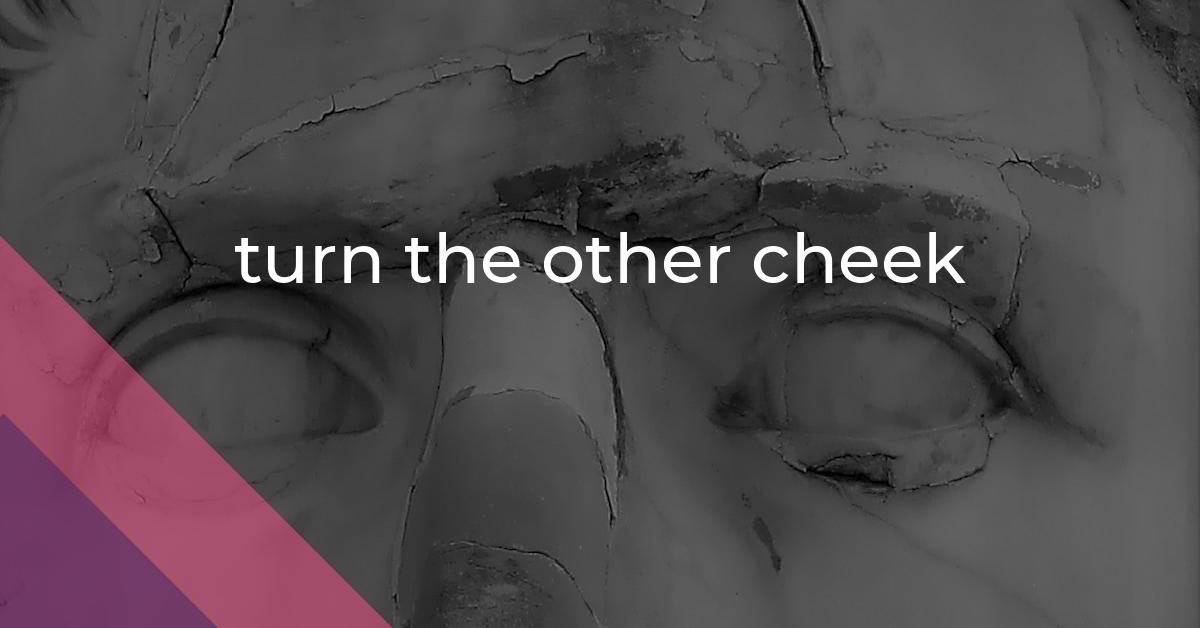turn the other cheek: Idiom Meaning and Origin
What does ‘turn the other cheek’ mean?
The idiom "turn the other cheek" means to respond to an insult or injury with non-violent resistance or forgiveness, rather than seeking revenge or retaliation.

Idiom Explorer
The idiom "turn the tables" means to reverse a situation or gain an advantage over someone who had previously had the upper hand.
The idiom "turn over a new leaf" means to start fresh or change one's behavior or habits for the better.
The idiom "turn on one's heel" means to abruptly and decisively change direction, often in a gesture of annoyance or indignation.
The idiom "turn one's nose up" means to show disdain or contempt towards something, often by refusing it or rejecting it with a gesture of disapproval.
The idiom "turn one's coat" means to switch sides or change one's allegiance for personal gain or advantage.
The idiom "turn one's back" means to purposely ignore, reject, or abandon someone or something. It implies a deliberate act of disengagement or disapproval.
The idiom "turn a deaf ear" means to ignore or refuse to listen to something, especially when it is a request or advice.
The idiom "turn a blind eye" means to deliberately ignore or pretend not to notice something, especially something that is wrong or illegal.
The idiom "tit for tat" means to respond to an action with a similar action, often used when two individuals take revenge or fight against each other.
The idiom "take something in stride" means to handle or deal with something difficult or challenging in a calm and relaxed manner, without being overly affected or upset by it.
Unconventional interpretation
Originating from the Christian Bible, the idiom "turn the other cheek" is a well-known expression that has become deeply embedded in the English language. This idiom carries a meaning of non-retaliation and responding to an offense with kindness rather than aggression. Its biblical origin lies in the book of Matthew, where Jesus advises his followers to "turn the other cheek" when someone strikes them. This idiom has since been used figuratively in various contexts, both religious and secular, to convey the concept of responding peacefully to aggression or provocation.
The phrase "turn the other cheek" has its roots in religious teachings and has been included in the Sermon on the Mount, attributed to Jesus Christ. In the Bible, Jesus preaches tolerance, forgiveness, and love for one's enemies, urging his followers to refrain from seeking revenge or responding in kind to those who harm them. The specific passage that mentions turning the other cheek can be found in the book of Matthew, chapter 5, verse 39: "But I tell you, do not resist an evil person. If anyone slaps you on the right cheek, turn to them the other cheek also."
This idiom has found its way into everyday language and discourse, transcending its original religious context. It is often used to advocate for non-violence, promote tolerance, and encourage individuals to rise above conflict or provocation. By turning the other cheek, one is metaphorically demonstrating a refusal to engage in further aggression or retaliation, instead choosing a path of peace and forbearance.
The phrase has been extensively used in various literary works, speeches, and cultural references, exemplifying its widespread popularity and significance. Its appearance in literature and rhetoric serves to emphasize the importance of remaining composed and refusing to respond to hostility with hostility.
Despite its positive connotations, the idiom "turn the other cheek" is not without its critics and complexities. Some argue that it can be interpreted as a call for passivity or condoning abuse, ignoring the need to stand up against injustice. The idiom's meaning has been subject to interpretation and has been discussed in religious and philosophical circles, with varying perspectives on its application and implications.
While "turn the other cheek" may be viewed as a straightforward call for peaceful resolution, it is essential to consider the nuanced nature of its interpretation. The idiom navigates the complexity of human interactions, raising questions about morality, ethics, and personal boundaries. Although the phrase is often championed as a virtuous ideal, its practical application in everyday life can be challenging and multifaceted.
One related idiom, "turn the tables," shares a similar theme of responding to adversity but with a different approach. "Turn the tables" refers to reversing a situation or gaining the upper hand after being at a disadvantage. This idiomatic expression suggests that instead of passively accepting a negative situation, one should take proactive steps to change it. While "turn the other cheek" encourages avoiding retaliation, "turn the tables" encourages taking action to overcome obstacles and achieve a favorable outcome.
Another related idiom, "look the other way," has a contrasting meaning to "turn the other cheek." "Look the other way" implies deliberately ignoring or pretending not to notice something. This idiom often conveys a sense of willful ignorance or avoidance, often in the context of overlooking wrongdoing or turning a blind eye to an unpleasant truth. While "turn the other cheek" advocates for responding peacefully to aggression, "look the other way" suggests choosing to ignore or disregard a situation altogether.
As this analysis concludes, one is left to ponder the unexplored depths of the idiom "turn the other cheek." Its rich history, religious origins, and cultural significance provide a glimpse into humanity's ongoing search for peace, reconciliation, and the true meaning of forgiveness. While the idiom may seem straightforward at first, its complexities and alternative interpretations invite further contemplation. "Turn the other cheek" remains an enduring phrase that continues to resonate with individuals across cultures and generations, serving as a reminder of the power of forgiveness and the potential for peaceful resolution.
Example usage
Examples:
- When my coworker insulted me, I decided to turn the other cheek rather than confront them.
- Instead of seeking revenge, the character in the story chose to turn the other cheek and forgive his enemies.
- During the argument, Sarah remained calm and turned the other cheek, refusing to engage in further conflict.
Analysis:
The idiom "turn the other cheek" refers to choosing not to retaliate or seek revenge when faced with an insult or injury. It is often associated with responding to hostility or offense with kindness and forgiveness. The idiom is derived from a biblical reference in the New Testament where Jesus teaches his followers to not resist an evil person, but rather to offer the other cheek when struck.
In the examples provided, the idiom is used in different scenarios to illustrate the act of responding with forgiveness and non-violence. In the first example, someone chooses to ignore or overlook an insult from a coworker. In the second example, a character in a story demonstrates the importance of forgiving one's enemies rather than seeking retribution. In the third example, Sarah maintains her composure and refuses to escalate an argument, opting for peaceful resolution.
More "Forgiveness" idioms



